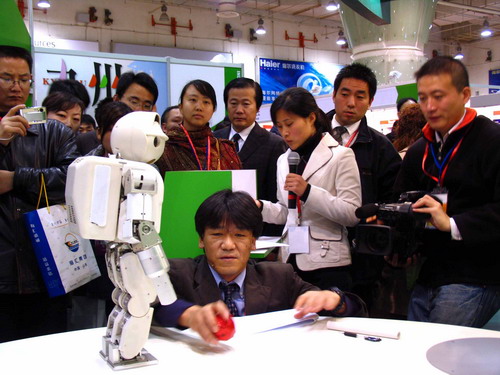|
 Visitors to a trade fair involving businesses from China, Japan and South Korea look at a robot in Qingdao, Shandong province. Experts say the time is ripe for the three countries to start talks on establishing a free trade area. [Photo/China Daily]
|
Obstacles could derail proposal for trilateral trade agreement
The time is ripe for establishing a Free Trade Area among China, Japan and South Korea but various uncertainties have delayed talks about that possibility from starting, officials and experts said on Tuesday.
Zheng Xinli, vice-chairman of the China Center for International Economic Exchanges, said Japan's interest in becoming a member of the Trans-Pacific Partnership - a free trade agreement that now involves Australia, Brunei Darussalam, Chile, Malaysia, New Zealand, Peru, Singapore, Vietnam and the United States - raises questions about the likelihood of the proposed trilateral agreement being formed. So does the existence of a separate free trade agreement between South Korea and the US, Zheng said.
Meanwhile, South Korea will soon be preoccupied by its 2012 presidential election and Japan is still repairing the damage caused by the earthquake that struck it in March last year. For those reasons, "it's uncertain whether free trade agreement talks can start among the three countries this year", Zheng said at a forum in Beijing.
Zheng said the goal of establishing the proposed agreement is not a far-fetched one. But if progress toward that end is delayed, the countries can still agree to charge no duties on imports of products made by the new-energy and low-carbon industries and take similar steps.
During the East Asian Summit held in November 2011, Chinese Premier Wen Jiabao discussed a schedule that would have free trade talks start among China, Japan and South Korea this year, a proposal that met with approval from Japan and South Korea.
In March, Chen Deming, Chinese minister of commerce, said the negotiations may start as early as May, when officials from the three countries are to meet in Beijing.
Ahn Hyun-ho, executive vice-chairman of the Korean International Trade Association, said research has been conducted and completed on the proposed agreement and officials will be briefed on the results of that work at the May summit.
The economies of the 10 countries that make up the Association of Southeast Asian Nations plus China, Japan and South Korea are expected to surpass the US' in 2014 and the EU's in 2020. Even so, the region's economic integration is expected to proceed at a slower pace as the countries are hampered by unbalanced development and a lack of a central organization, Ahn said.
China, Japan and South Korea together contribute 70 percent of Asia's economic output and one-fifth of the world's. For that reason, "the integration of Asian economies will be meaningless without the integration of those three markets", Zheng said.
Even so, the trade that now takes place among the three countries only accounts for 11 percent of their total foreign trade, while investment exchanges among themselves only account for 6 percent of their total such exchanges.
"Cooperation within the region is being hindered by many political and economic reasons, but a big obstacle is an unwillingness to accept each other because of historic troubles," said Zhang Xiaoji, a researcher at the State Council's Development Research Center.
"An ideal solution would lie in a comprehensive cooperation framework, but that would not be an easy thing (to establish)," said Fukukawa Shinji, president of the Japan-China Organization for Business, Academia & Government Partnership.
Huo Jianguo, president of the Ministry of Commerce's Chinese Academy of International Trade and Economic Cooperation, said the three countries share at least one characteristic: They are highly dependent on energy imports.
Meanwhile, the shipping industry would also be likely to benefit from a free trade agreement. Chen Wenling, chief economist at the China Center for International Economic Exchanges, said Northeast Asian harbors, without the advantage of operating under such an agreement, tend to be inefficient, even though they handle the largest amounts of cargo in the world.
weitian@chinadaily.com.cn
